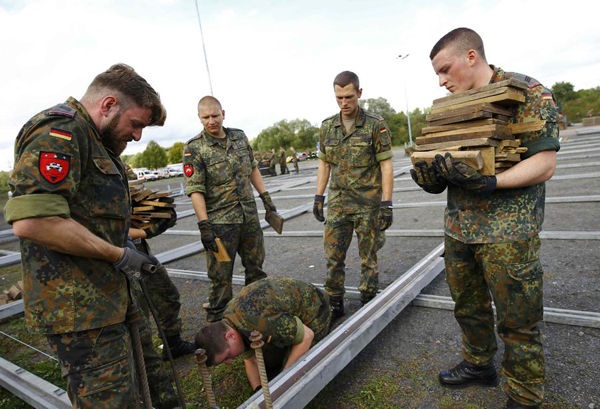Border-free Europe unravels in migrant crisis
Updated: 2015-09-14 22:06
(Agencies)
|
|||||||||||
EMERGENCIES
Schengen countries are permitted to reimpose border checks on a temporary basis in emergencies, and have occasionally done so in the past on security grounds during major sports tournaments or international summits, but not on this scale.
Most of the refugees have been bound for Germany, which announced in August it would suspend EU asylum policy to accept Syrians who arrive elsewhere in the EU, luring more to trek across the bloc.
Austria had shuttled refugees directly on to Germany. But since Berlin announced border controls on Sunday, migrants have walked across the border into Austria from Hungary at the fastest rate yet, without being able to travel onward. An Austrian police spokesman said in the early afternoon that 9,000 people had arrived since midnight, after 14,000 on Sunday.
"The accommodation centres in Nickelsdorf, Parndorf, and in the near surroundings are all full," the police spokesman said, of an area near the main border crossing.
The threat to reimpose border controls has spread beyond the southern and eastern countries along the main migration paths. The Dutch justice ministry said it would impose "mobile controls" in border regions. The Netherlands received 3,000 asylum seekers last week, double the number from a week before.
German Chancellor Angela Merkel has taken a lead, announcing that Europe's biggest economy was willing to host hundreds of thousands of refugees and preparing for as many 800,000 asylum requests this year. Her vice chancellor said in a letter to party members seen by Reuters that figure could reach 1 million.
EU Commission President Jean-Claude Juncker has proposed a formula to distribute refugees based on member states' economic strength and population. But eastern European countries such as Poland, Slovakia and Hungary itself strongly oppose quotas, even though Hungary would be one of the three beneficiaries.
French President Francois Hollande, who has joined Merkel in campaigning hard for quotas, called for rapid agreement on control of entrants along the EU's external borders as well.
"In concrete terms that means putting registration centres in Greece, Italy and Hungary," Hollande said. "It must be sorted out today."
Related Stories
Hungary rushes to finish migrant-stopping fence 2015-09-14 07:59
Germany re-imposes border controls to slow migrant arrivals 2015-09-14 07:29
Migrant numbers significant but not insurmountable 2015-09-08 09:46
Authorities struggle to identify dead in migrant tragedies 2015-09-06 16:43
Migrant chaos at Budapest train station 2015-09-02 11:38
Today's Top News
Cameron urges support for Syrian refugees in Lebanon, Jordan
Hungary launches border crackdown, says refugees risk expulsion
China, Belgium have great potential in nuclear power generation
Georgian Prime Minister awarded honorary professorship
Border-free Europe unravels in migrant crisis
Refugee crisis: Germany re-imposes border controls
Australia gets new PM as Abbott loses out to rival Turnbull
Egyptian security forces shoot at Mexican tourist convoy, kill 12
Hot Topics
Lunar probe , China growth forecasts, Emission rules get tougher, China seen through 'colored lens', International board,
Editor's Picks

|

|

|

|

|

|







